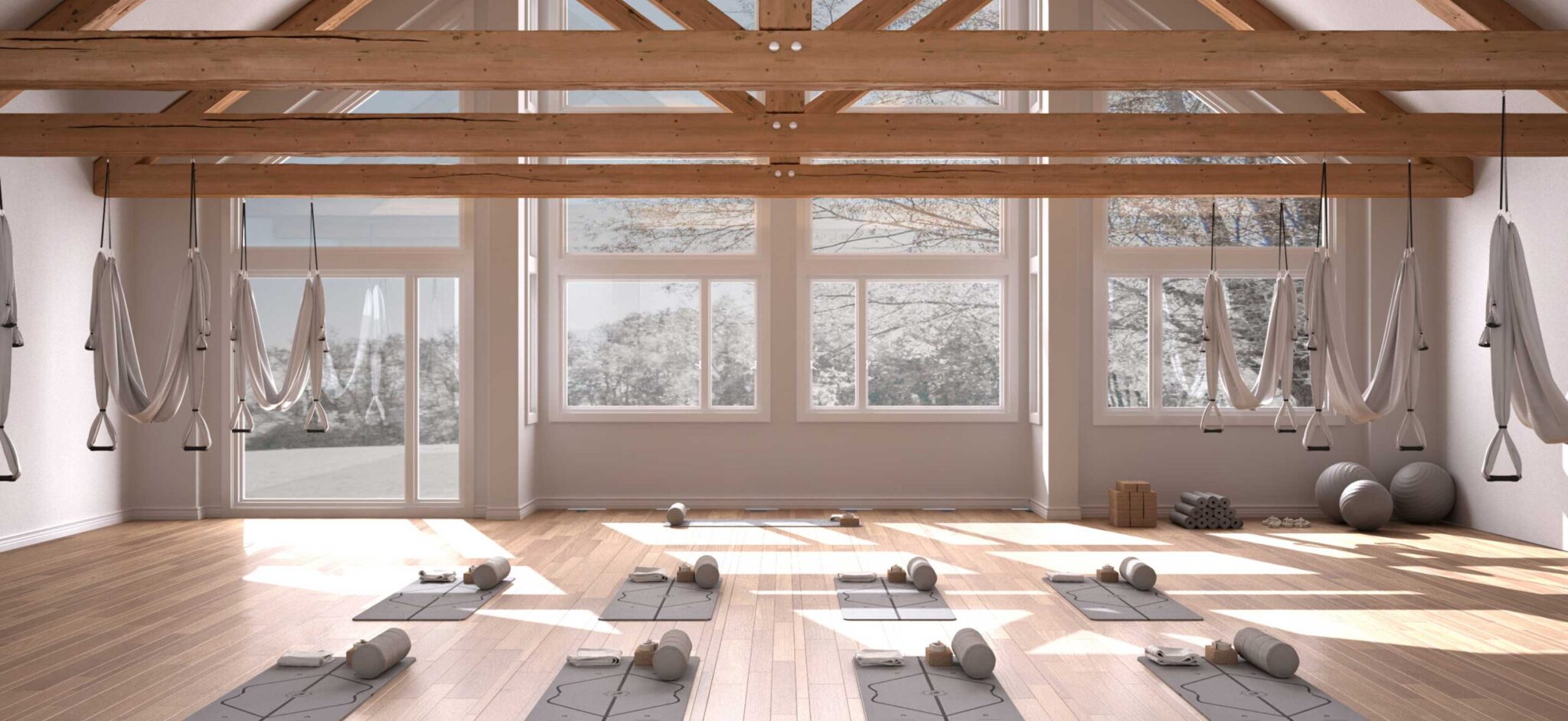Have you ever stepped into a yoga studio and immediately felt a sense of tranquility? The way the space is designed—from its gentle lighting to the subtle scents—calms your mind and prepares you to step onto the mat. In an era where yoga’s popularity continues to rise, well-designed studios aren’t just a luxury; they’re a necessity to attract devoted students and foster a true sense of community.
This blog explores essential elements for designing a yoga studio that inspires teachers and practitioners. We’ll explore the practical considerations like layout, flow, and the sensory details that elevate a yoga space from simply functional to truly transformative. Whether you’re starting from scratch or looking to refresh an existing studio, this guide offers insights to help you create a haven for the mind, body, and spirit.
Want to enhance your studio’s operations? Explore Yoga Studio Software to manage your space and improve client experience.
Tip 1: Crafting a Functional Yoga Studio Layout
A well-designed yoga studio should promote a sense of ease and flow from the moment a student steps through the door. Functionality is crucial for both the studio’s daily operation and your students’ overall experience. Consider these essential components when planning your layout:
- Reception: A welcoming reception area sets the tone for the student’s experience. Ensure its well-lit and designed to handle class check-ins efficiently.
- Storage: Designated storage for shoes, coats, and personal belongings keeps practice spaces clutter-free.
- Retail: If you offer yoga accessories or apparel, create a visible and inviting retail display that doesn’t obstruct movement.
- Changing Rooms: Private and easily accessible changing rooms are an essential element for student comfort.
- Yoga Room: The heart of your studio deserves careful planning. Consider anticipated class sizes, the style of yoga offered, and strategically placed entrances for smooth transitions.
Tip 2: Setting the Mood: Light, Color, and Sound
The ambiance of your yoga studio plays an influential role in creating a transformative experience for students. By carefully considering elements like lighting, color, and sound, you can cultivate an environment that promotes relaxation, focus, or even invigorates, depending on the style of yoga you teach.
- The Power of Light: Natural light is ideal for a yoga studio, creating a sense of openness and connection to the outdoors. If ample natural light isn’t possible, thoughtfully designed artificial lighting can mimic its calming effects. Consider dimmable options to adjust the mood for different classes.
- Color Psychology: Your studio’s color palette can significantly impact the energy of the space. Soft, earthy tones promote tranquility, while brighter accents can be used sparingly for energizing classes.
- The Role of Sound: The right soundtrack can enhance a yoga practice, but silence can be equally powerful. Determine whether gentle, ambient music aligns with your studio’s vision. If not, focus on ensuring the space is well-insulated from outside noise to cultivate a sense of stillness.
Tip 3: Appealing to the Senses
A thoughtfully designed yoga studio engages more than just sight and sound. Subtle sensory details can profoundly enhance your students experience, deepening their relaxation and focus.
- Scent: The power of scent shouldn’t be underestimated. Consider using calming essential oils (like lavender or chamomile) in a diffuser or incorporating them subtly into cleaning products. Be mindful of strong scents that might not be universally enjoyed.
- Air Quality and Temperature: Fresh air and comfortable temperatures are essential for physical comfort. Invest in a good ventilation system and ensure the ability to adjust temperatures for different class styles (a slightly warmer room might be ideal for a restorative practice).
- The Power of Touch: Your spaces textures matter. Choose soft, comfortable flooring that supports yoga poses. Incorporate natural elements like wood, plants, and cozy blankets to create a sense of warmth and invitation.
Tip 4: Personalizing Your Space
While thoughtful design is crucial, the unique touches will make your yoga studio truly memorable. This is where you can infuse your brand’s personality and create a space that reflects your studio’s philosophy.
- Create a Meditation Corner: If space allows a dedicated meditation corner with comfortable cushions or floor seating offers a peaceful retreat for students before or after class.
- Foster a Sense of Community: A cozy lounge area or tea station encourages students to linger, fostering connection and a sense of community within your studio.
- Mindful Storage Solutions: Well-designed storage keeps clutter at bay. Consider incorporating built-in cubbies for students’ belongings and elegant solutions for storing yoga props.
- Express Your Brand: Subtly incorporate your studio’s logo, colors, and overall aesthetic into design elements – from wall art to the accessories you choose.
Tip 5: Designing for Success
Creating an inspiring yoga studio goes beyond aesthetics. Practical considerations are equally important to ensure a smooth operation and accommodate your long-term goals.
- Durable and Functional Flooring: Choose flooring specifically designed for yoga practice. It should offer the right balance of support and cushioning, be easy to clean, and durable enough to withstand the wear and tear of regular classes.
- Accessibility and Inclusivity: Strive to create a welcoming space for everyone. Consider accessibility features such as ramps, grab bars, and adaptable yoga props to ensure your studio is inclusive for students of all abilities.
- Versatile Lighting: Invest in a lighting system that allows you to adjust brightness and warmth to suit different class styles. Consider dimmers, spotlights, and task lighting for retail areas.
- Plan for Growth: Even if you’re starting small, consider your future goals. Could your space accommodate additional classes or workshops? Designing with flexibility in mind can save you from costly renovations down the line.
Beyond the Mat: Yoga Studio Design That Elevates the Soul
A well-designed yoga studio is more than just a workout space. It’s a peaceful haven where students can find calm, improve their focus, and connect with themselves. Whether you’re refreshing an existing studio or starting from scratch, these design tips will help you create a truly inspiring yoga space. And remember, even a small studio can feel incredibly peaceful with the right touches.
Ready to take your design further? Explore our other blog resources for building a strong brand identity.

by Julie Sippy Senior Marketing Manager, Brand & Community
-
First published: April 26 2024
Written by: Julie Sippy
